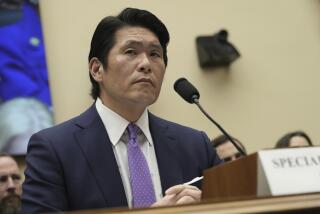Lawyers for Clinton Defend Their Whitewater Actions
- Share via
WASHINGTON — A White House lawyer and two former colleagues, pressed to explain controversial notes of a 1993 strategy meeting, insisted Tuesday that they conducted themselves properly and never sought to hide documents from Whitewater investigators.
Deputy White House Counsel Bruce Lindsey and two former presidential lawyers, Neil Eggleston and William Kennedy, appeared before the Senate Whitewater Committee to explain notes taken by Kennedy that contained such phrases as “vacuum . . . Rose Law files,” a reference to the former Little Rock, Ark., firm in which Kennedy and First Lady Hillary Rodham Clinton were partners.
Kennedy flatly rejected suggestions from the Republican-controlled panel that this notation meant that the lawyers had discussed destroying or hiding law firm records relating to Madison Guaranty Savings & Loan, a failed thrift for which Hillary Clinton had performed legal work. Madison was owned by James B. and Susan McDougal, partners with President Clinton and his wife in the Whitewater real estate project of the 1980s.
“I was referring to an informational vacuum,” Kennedy testified. “The Rose law files relating to Whitewater were a shambles. When you tried to get your arms around the records, you just couldn’t find them all.”
The testimony featured another collision between a curious piece of Whitewater evidence and a belated White House explanation for it and, as happened often in the past, the truth was left open to interpretation.
The White House contends that attorneys like Kennedy were just helping the administration pull together available information on Whitewater matters to respond to the blitz of inquiries it was receiving. Republicans argue that the notes are further evidence of a White House trying to cover up questionable actions by “vacuuming” files that might show wrongdoing.
In their testimony, Lindsey and Eggleston said that the purpose of the Nov. 5, 1993, meeting was to bring David E. Kendall, a private Washington attorney who has been representing the Clintons, “up to speed on what the facts were” and to delineate the proper roles between White House lawyers and Kendall and thus avoid ethical problems.
The lawyers resolved at the meeting to have Kendall represent the Clintons in inquiries by the Whitewater special counsel and the Resolution Trust Corp., which was investigating the collapse of Madison Guaranty, and for him to do so without any “inside” help by the White House legal staff, the two men said.
When the committee asked Kennedy about a notation reading, “Try to find out what’s going on in investigation,” he said that the White House never sought out confidential government records.
The White House made notes of the meeting public last month after the committee moved to seek court enforcement of its subpoena for them. Clinton had argued that he wanted to release the notes but was advised by lawyers not to do so unless the committee stipulated that by doing so he was not waiving his attorney-client privilege--something no president has ever done.
The panel agreed and also conceded that the appearance by Lindsey, Eggleston and Kennedy did not constitute a waiver of attorney-client privilege.
Eggleston was questioned at length by Michael Chertoff, the panel’s chief counsel, about Whitewater-related files he obtained from the Small Business Administration 11 days after the meeting. Eggleston said that he did so at the suggestion of then-White House counsel Bernard Nussbaum after learning from press reports that a House committee had obtained the same files under subpoena.
Eggleston said that the files were “routine, unremarkable and non-sensitive,” were never given to Kendall and were only useful for answering any White House press queries about another Arkansas firm, Capital Services Management, that had figured in press accounts. A principal in that SBA-financed firm, former Municipal Judge David Hale, had alleged that Clinton pressured him in the mid-1980s to make an improper federally backed loan to the Clintons’ Whitewater business partners.
As has often occurred at Senate Whitewater hearings, each side accused the other of partisanship. Sen. Christopher S. Bond (R-Mo.) said that Democrats had unfairly attacked Chairman Alfonse M. D’Amato (R-N.Y.) “for pursuing legitimate lines of questions” when the main fault lay with “the sudden discovery of long-lost documents” by the White House.
Sen. Paul S. Sarbanes (D-Md.) responded that Republicans were making “accusations and judgments first, and getting the facts later.”
More to Read
Get the L.A. Times Politics newsletter
Deeply reported insights into legislation, politics and policy from Sacramento, Washington and beyond. In your inbox twice per week.
You may occasionally receive promotional content from the Los Angeles Times.










